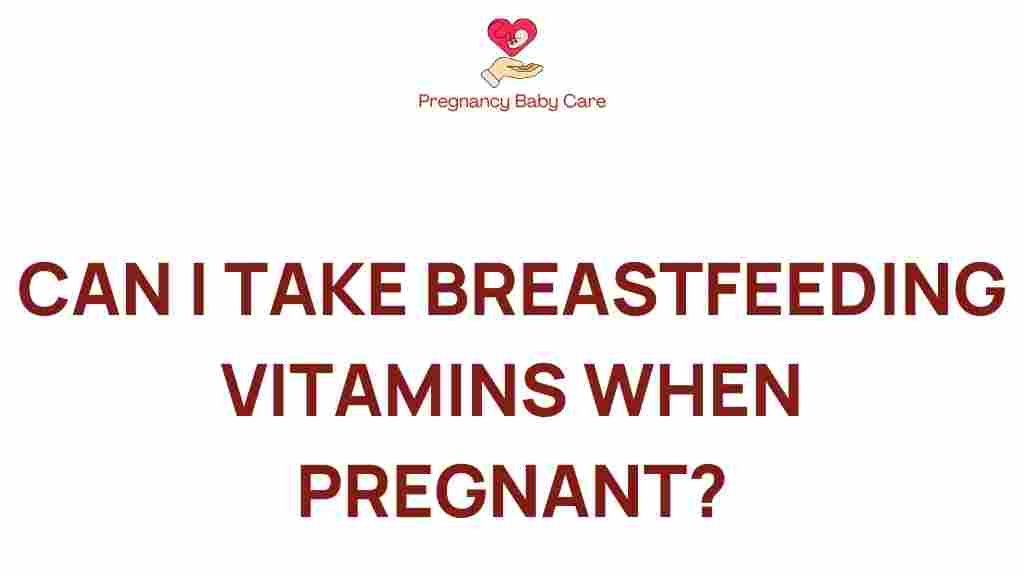The Surprising Truth: Can You Take Breastfeeding Vitamins During Pregnancy?
When it comes to maternal nutrition, ensuring that both mother and baby receive the essential nutrients during pregnancy is crucial. Many expectant mothers often wonder about the safety and efficacy of taking breastfeeding vitamins during this critical time. This article aims to shed light on the topic, discussing breastfeeding vitamins, their role in pregnancy, and what you need to know to maintain prenatal health.
Understanding Breastfeeding Vitamins
Breastfeeding vitamins are specially formulated supplements designed to support nursing mothers as they provide nutrition to their infants. These vitamins typically contain a mix of essential nutrients such as:
- Vitamin D
- Calcium
- Iron
- Omega-3 fatty acids
- B vitamins
These nutrients are vital for both the health of the breastfeeding mother and the development of the baby. However, the question arises: Are these vitamins safe to take during pregnancy?
The Safety of Taking Breastfeeding Vitamins During Pregnancy
While breastfeeding vitamins are beneficial for nursing mothers, they are not specifically formulated for pregnant women. Prenatal vitamins are designed to meet the nutritional needs of pregnant women, containing higher levels of certain nutrients that are critical during pregnancy.
Here are some considerations regarding the safety of breastfeeding vitamins during pregnancy:
- Vitamin Overload: Taking breastfeeding vitamins can lead to excessive intake of certain vitamins and minerals, which may not be safe during pregnancy. For example, excessive vitamin A can be harmful to fetal development.
- Different Nutritional Needs: The nutritional requirements during pregnancy differ from those during breastfeeding. Prenatal vitamins typically include folic acid, which is crucial for preventing neural tube defects.
- Consult Your Healthcare Provider: It’s essential to discuss any supplement intake with your healthcare provider to ensure that it aligns with your individual health needs.
What to Consider When Choosing Supplements During Pregnancy
If you’re considering taking breastfeeding vitamins during pregnancy, keep the following points in mind:
- Consultation: Always consult your doctor or a registered dietitian before starting any new supplement, especially during pregnancy.
- Opt for Prenatal Vitamins: Look for prenatal vitamins that cater specifically to pregnant women, as they contain the ideal mix of nutrients needed for fetal development.
- Monitor Your Diet: Focus on a balanced diet rich in fruits, vegetables, whole grains, lean proteins, and healthy fats to ensure adequate nutrient intake.
Key Nutrients for Prenatal Health
During pregnancy, certain nutrients play a pivotal role in ensuring the health of both mother and baby. Key nutrients to focus on include:
- Folic Acid: Crucial for DNA synthesis and preventing neural tube defects.
- Iron: Important for preventing anemia and supporting increased blood volume.
- Calcium: Essential for the development of the baby’s bones and teeth.
- Omega-3 Fatty Acids: Important for brain development and overall fetal growth.
- Vitamin D: Supports calcium absorption and is vital for bone health.
Step-by-Step Process for Ensuring Maternal Nutrition
To maintain optimal maternal nutrition during pregnancy, follow these steps:
- Consult Your Healthcare Provider: Schedule a pre-natal check-up to discuss your dietary needs and any supplements.
- Assess Your Diet: Evaluate your current eating habits and identify areas for improvement. Include a variety of food groups.
- Choose the Right Supplements: If necessary, select prenatal vitamins that meet your needs. Look for those that include folic acid, iron, and DHA.
- Monitor Nutrient Intake: Keep track of your daily nutrient intake through a food diary to ensure you’re meeting your dietary goals.
- Stay Hydrated: Drink plenty of water throughout the day to stay hydrated and support overall health.
Troubleshooting Common Concerns
Many pregnant women have concerns regarding supplements and their safety. Here are some common issues and their solutions:
- Nausea or Digestive Issues: If you experience nausea from taking prenatal vitamins, try switching to a different brand or taking them with food.
- Uncertainty About Dosages: If you’re unsure about the right dosage, consult your healthcare provider for personalized recommendations.
- Interactions with Other Medications: Inform your doctor about any other medications or supplements you are taking to avoid potential interactions.
Conclusion: Prioritizing Maternal Nutrition
In conclusion, while breastfeeding vitamins are beneficial for nursing mothers, they may not be the best choice during pregnancy due to differing nutritional needs and potential safety concerns. Expecting mothers should prioritize prenatal health by focusing on a balanced diet and consulting with healthcare providers regarding any supplements.
Ultimately, the goal is to ensure that both mother and baby receive the necessary nutrients for a healthy pregnancy. For additional information on prenatal vitamins and maternal nutrition, check out resources from the CDC on maternal nutrition.
Remember, your health and your baby’s health are paramount, so always make informed decisions when it comes to supplements and nutrition during this beautiful journey of pregnancy.
This article is in the category Pregnancy and created by PregnancyBabyCare Team
